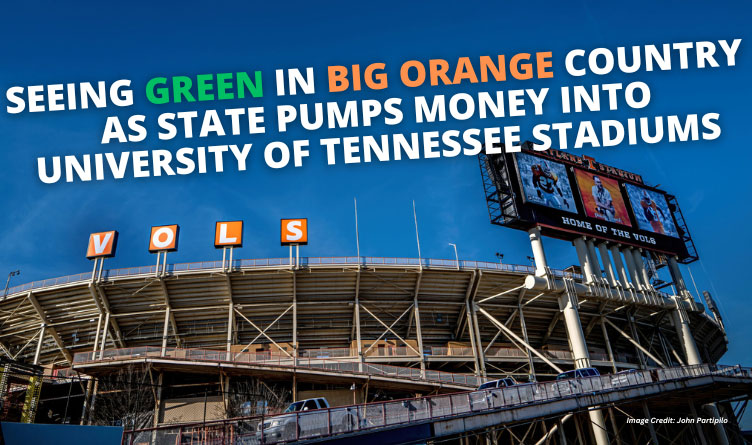Records show lawmakers approved $435 million for construction projects at athletic facilities at UT-Knoxville.
Image: Neyland Stadium at the University of Tennessee Knoxville. Image Credit: John Partipilo
By Sam Stockard [The Tennessee Lookout -CC BY-NC-ND 4.0] –
Money for Tennessee Vols football and baseball stadiums is flowing like the beer and whiskey at a Big Orange tailgate party.
In the last decade alone, Tennessee’s State Building Commission approved $500 million worth of improvement projects for University of Tennessee athletics facilities, mainly Neyland and Lindsey Nelson stadiums, at the Knoxville campus, roughly 30% of $1.6 billion spent there overall, state records show.
When No. 1-ranked Tennessee baseball advanced to the championship of the College World Series after wrapping up the Knoxville Super Regional, it opened the way for completion of a $96 million job at Lindsey Nelson Stadium. The Vols won their first game in Omaha, Nebraska with a thriller over Florida State before thumping North Carolina and Florida State again to advance to the finals against Texas A&M.

The university also is wrapping up work in 2026 on a $337 million improvements project at Neyland Stadium, designed to improve the game-day experience for 102,000 fans at seven home football games each year.
The Vols football program hasn’t won a national championship since 1998, but hope springs eternal, and football boosters converge on Neyland every fall to cheer for a return to national prominence. A short-lived No. 1 ranking in 2022 fueled the hysteria.
The UT Board of Trustees approved a $49 million increase in the project in June 2023 as part of a plan to improve Wi-Fi connections, add a modern video board and make additions to club seats and social deck areas. Elevators are being added along with new entries, skybox renovations, concourse expansions, a Founders Suite and movement of Tee Martin Drive.
Funding for these large projects comes from athletics-generated revenue, including private donations, UT-Knoxville athletics plant funds and state bonds, according to a university spokesperson. No public funds are used, but the projects must be approved by the State Building Commission, which is made up of House and Senate speakers and the state’s constitutional officers, some of whom wear orange like a badge of honor.
Gov. Bill Lee, an Auburn University graduate, says he leaves decisions for campus projects up to University of Tennessee leadership but believes they’ve “created a strong pathway for academics.”
Along with athletics upgrades, the State Building Commission approved a $227.3 million building project in 2023 for the Haslam College of Business, which received $100 million in private funding. In addition, the university spent $25.1 million on a Carousel Theatre replacement, $108.2 million on a nursing building and $5.5 million on classroom upgrades, among numerous other projects.
“They know what needs to be invested in, and whether it’s a chemistry building or a football stadium, they know the balance of investments there, and I trust the board of directors to develop that strategy and put it before the state,” Lee says.

Democratic state Rep. Sam McKenzie of Knoxville supports the efforts, pointing out sporting events at the University of Tennessee help drive Knoxville’s economy.
“We’re a little more than a college town, but we’re heavily, heavily dependent on that to bring people in as a draw. So with baseball’s popularity going through the roof right now and football’s always been a mainstay there in East Tennessee, it brings the dollars in,” says McKenzie, whose son attends UT-Knoxville and whose brothers, Raleigh and Reggie, played for the Vols in the 1980s.
Having a strong athletic program is even more critical as the Southeastern Conference takes on more prominence in the college football landscape, McKenzie says.
Universities of Texas and Oklahoma are joining SEC play this year – the Vols play at Oklahoma on Sept. 21 – spreading the conference’s influence.
“We’re a force to be reckoned with, so in order to be competitive, that’s kind of the market that we’re in,” McKenzie says.
In addition to the Haslam College of Business, the state approved $45 million in 2016 for the expansion of Haslam Field, a practice facility for Vols football. Jim Haslam, the father of former Gov. Bill Haslam, is a longtime athletics booster who played for legendary coach Robert Neyland.
Besides major projects for football and baseball, over the last 10 years the State Building Commission approved $5.6 million for a tennis center and Lindsey Nelson patio, $5 million for intramural field renovations, $1.25 million for LaPorte Stadium track repair, $4.75 million for Lee Stadium improvements, $3.6 million for a golf weight training facility and $1.1 million for Goodfriend Tennis Center replacement.


About the Author: Sam Stockard is a veteran Tennessee reporter and editor, having written for the Daily News Journal in Murfreesboro, where he served as lead editor when the paper won an award for being the state’s best Sunday newspaper two years in a row. He has led the Capitol Hill bureau for The Daily Memphian. His awards include Best Single Editorial from the Tennessee Press Association. Follow Stockard on Twitter @StockardSam



2 Responses
Spending TN Taxpayers money on sports stadiums is disgusting and I’ll vote against people who do it.
All Tn education facilities need to be put on a public funding diet until they abolish all racist social engineering programs;CRT, DEI, and anything else that fits the bill.
Especially seperate divisive programs,spaces and facilitating pornograhy.